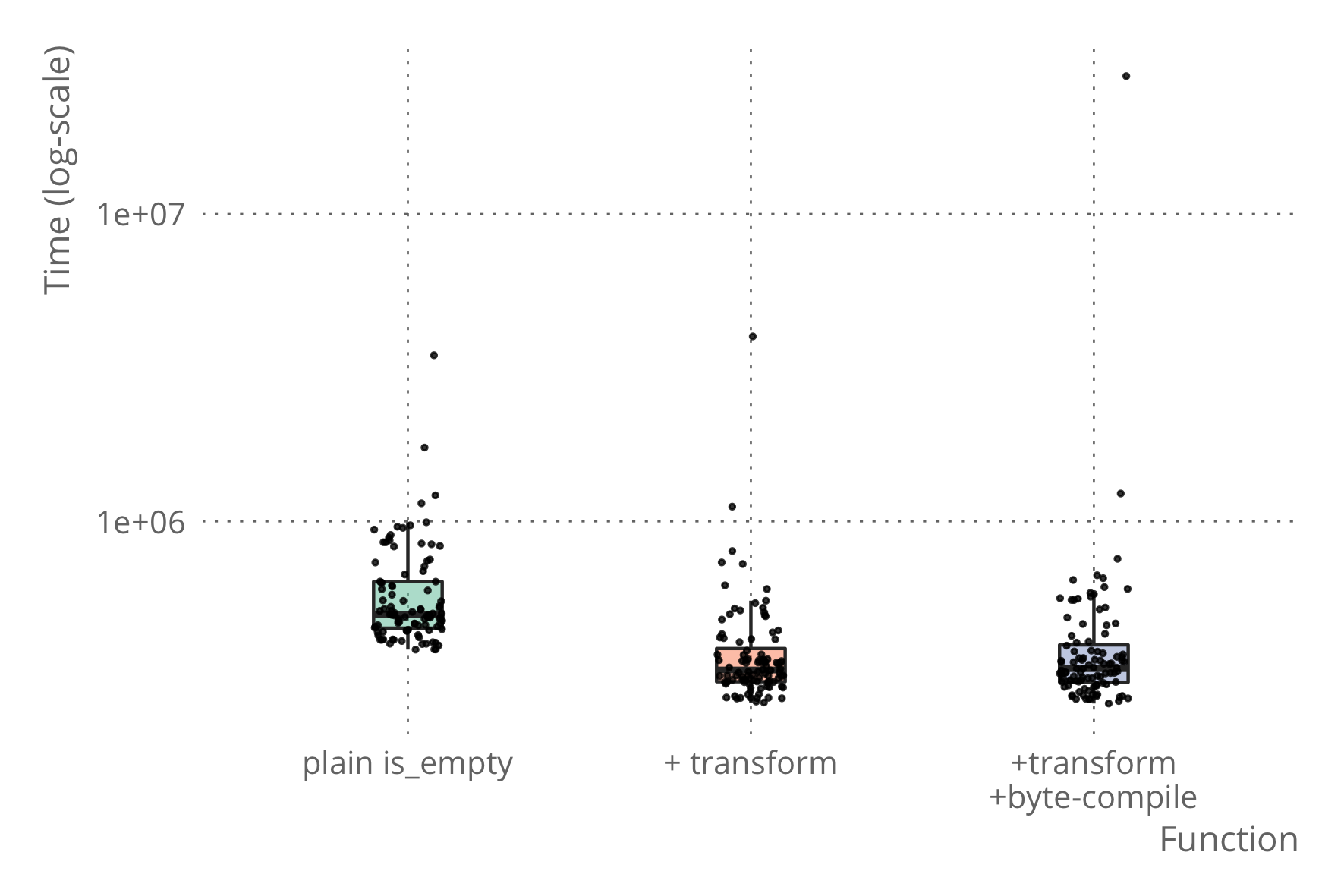Transforming functions with cases calls
The issue with byte-compilation I wrote about yesterday can indeed be fixed by transforming functions that call cases. And that was very easy to implement since I already had all the bits and pieces I needed for it from the tailr transformations.
To remind you, the issue was with byte-compiling functions that use the pmatch DSL in a cases call. For example, this function that tests if a tree is a leaf:
library(pmatch)
tree := L(num) | T(left : tree, right : tree)
is_leaf <- function(tree) {
cases(tree,
L(x) -> TRUE,
otherwise -> FALSE)
}The function works as intended so in usual code you will not run into any issues with it.
is_leaf(L(1))## [1] TRUE
is_leaf(T(L(1),L(2)))## [1] FALSE
If you use it in a package, though, it will (by default) be byte-compiled, and the byte-compiler does not approve of assigning to TRUE or FALSE.
compiler::cmpfun(is_leaf)## Error: bad assignment: 'TRUE <- L(x)'
There is a similar issue if you want to throw errors with stop. This works fine
get_left <- function(tree) {
cases(
tree,
T(left, right) -> left,
otherwise ->
stop("There is no left tree!", call. = FALSE)
)
}get_left(T(L(1),L(2)))## L(num = 1)
get_left(L(1))## Error: There is no left tree!
but the byte-compiler will complain
compiler::cmpfun(get_left)## Error: bad assignment: 'stop("There is no left tree!", call. = FALSE) <- otherwise'
Transforming functions
We can get rid of this problem by transforming the functions that call cases. I already do this when I combine cases with tailr to make functions tail-recursive, so I already had this function:
transform_cases_call <- function(expr) {
stopifnot(rlang::call_name(expr) == "cases")
args <- rlang::call_args(expr)
value <- args[[1]]
patterns <- args[-1]
eval(rlang::expr(cases_expr(!!value, !!!patterns)))
}It takes a call object—the representation of a function-call when you manipulate R expressions—and returns a series of if-else-expressions, computed by the cases_expr function.
So far, I have only used this with tailr and its user-transformation plugin
attr(cases, "tailr_transform") <- transform_cases_callbut now I use it for this transformation function:
transform_cases_function_rec <- function(expr) {
if (rlang::is_atomic(expr) || rlang::is_pairlist(expr) ||
rlang::is_symbol(expr) || rlang::is_primitive(expr)) {
expr
} else {
stopifnot(rlang::is_lang(expr))
call_args <- rlang::call_args(expr)
for (i in seq_along(call_args)) {
expr[[i + 1]] <- transform_cases_function_rec(call_args[[i]])
}
if (rlang::call_name(expr) == "cases") {
expr <- transform_cases_call(expr)
}
expr
}
}
transform_cases_function <- function(fun) {
if (!rlang::is_closure(fun)) {
err <- simpleError("Function must be a closure to be transformed")
stop(err)
}
body(fun) <- transform_cases_function_rec(body(fun))
fun
}The way I test if a call to cases is actually a call to pmatch::cases is a bit dodgy. It only works if the cases that is in scope is the right one. To fix this, I have to carry the environment along in the recursions, but I haven’t implemented this yet.
Anyway, using this function, you can automatically rewrite a function from using calls to cases to using if-statements.
is_leaf_tr <- transform_cases_function(is_leaf)
is_leaf_tr## function (tree)
## {
## if (!rlang::is_null(..match_env <- pmatch::test_pattern(tree,
## L(x))))
## with(..match_env, TRUE)
## else if (!rlang::is_null(..match_env <- pmatch::test_pattern(tree,
## otherwise)))
## with(..match_env, FALSE)
## }
Results
After we have translated a function, there is no more alternative DSL syntax, and that satisfy the byte-compiler.
is_leaf_tr_bc <- compiler::cmpfun(is_leaf_tr)As an added benefit, the transformed function is a bit faster than the one that calls cases, and the byte-compiled function is a little faster still.
microbenchmark::microbenchmark(
is_leaf(L(1)), is_leaf_tr(L(1)), is_leaf_tr_bc(L(1))
)## Unit: microseconds
## expr min lq mean median uq max
## is_leaf(L(1)) 376.518 409.8650 509.4052 461.575 583.6055 1014.889
## is_leaf_tr(L(1)) 262.432 282.4065 426.9306 312.414 418.1800 4926.513
## is_leaf_tr_bc(L(1)) 261.465 289.3085 374.6340 324.090 429.9360 858.184
## neval
## 100
## 100
## 100

(Because of my issues with Hugo and blogdown, the plot is from a different run than the output from the benchmark command so they differ a bit. Qualitatively they show the same, though).
Of course, with transformations it just becomes more important that I solve the issue with CMD CHECK and transformed functions, but I have no idea how to approach that yet.